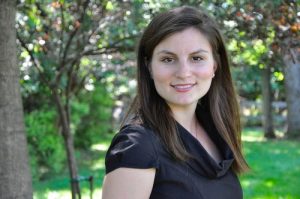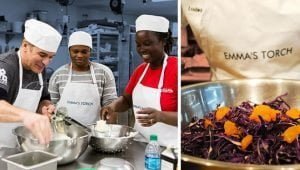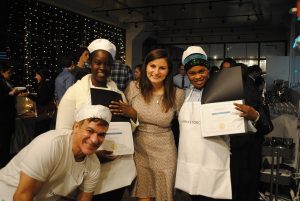The following is a conversation between Kerry Brodie, the Founder and Executive Director of Emma’s Torch, and Denver Frederick, Host of The Business of Giving on AM 970 The Answer in New York City.

Kerry Brodie © Emma’s Torch
Denver: While we speak to the leaders of some of the largest and most well established nonprofits on The Business of Giving, it’s also important that we hear from those who are starting up new and exciting ventures. And one of the most promising is Emma’s Torch. And here to tell you about it is Kerry Brodie, its Founder and Executive Director.
Good evening Kerry and welcome to The Business of Giving!
Kerry: Thank you so much. I’m so thrilled to be here.
Emma’s Torch is a nonprofit social enterprise and what we do is we provide culinary training and job placement services to refugees and survivors of human trafficking in New York.
Denver: Tell us about Emma’s Torch and the mission of the organization.
Kerry: Definitely. So, Emma’s Torch is a non-profit social enterprise and what we do is we provide culinary training and job placement services to refugees and survivors of human trafficking in New York. We’re very new. We just launched our program in June but it’s been an exciting an adventure and we’re already seeing the impact with our students.
Denver: How did you come up with this idea in the first place, Kerry?
Kerry: My background is actually in public policy. I was most recently working at the Human Rights Campaign in Washington D.C., but in my spare time, I was volunteering at homeless shelters and working with different food related causes and had this crazy idea. So many restaurants were complaining about the labor gap and that they don’t have enough trained staff and there’s a huge problem of unemployment and lack of training opportunities for refugees and survivors of human trafficking. And I think I’m very fortunate. My husband eventually got sick of me telling him about this crazy idea and asked me, “Who are you waiting for and what would it take for you to do this?”
So that was about two years ago. We moved to New York. I went to culinary school and it’s just been a really exciting adventure ever since.
Denver: It sounds that way. And share with our listeners the significance of the name of the organization, Emma’s Torch.
Kerry: Definitely. Emma’s Torch is named after Emma Lazarus. Emma Lazarus was a pioneering woman in the 1800 who really fought for the rights of refugees and she’s most well-known for her poem, which actually is on the base of the Statue of Liberty. And so for us, it was really important to remind people that so much of our legacy as a nation and so much of what we stand for is tied to this idea of welcoming in strangers. So, we like to give a little bit of a shout out to Emma Lazarus whenever we can.
Our students really come from all over the world. We had an English program earlier in the summer where I think we had eight students and seven different languages. They are from all over. We have a lot of refugees from the Middle East, asylees from West Africa and survivors of human trafficking from South America. And they find us through partnerships that we have with some of the largest refugee resettlement agencies in homeless shelters.
Denver: Sounds good to me. What parts of the world do the refugees who are part of your program come from and how do they find Emma’s Torch in the first place?
Kerry: Our students really come from all over the world. We had an English program earlier in the summer where I think we had eight students and seven different languages. They are from all over. We have a lot of refugees from the Middle East, asylees from West Africa and survivors of human trafficking from South America. And they find us through partnerships that we have with some of the largest refugee resettlement agencies in homeless shelters. These agencies, come day one, helped us establish and make sure that our program was really serving the needs of the community. And now they’re referring clients to our program. And so, it’s always the hardest part of the job is selecting the students because we are so small and there’s always so much more demand, but we’re hopeful that in the future, we can take on more students.
Denver: Sure thing. Has the political climate under the Trump administration and they’re stated intent about accepting… or not accepting… refugees in this country impacted your program in any way?
Kerry: It’s been really interesting. When I started laying the groundwork for the program, the numbers we were discussing were 100,000 plus in terms of number of refugees being let into the country. And there was such a groundswell around this idea of improving social services for refugees and making that process of resettlement better and better funded. That’s obviously changed in the last few months and that’s been really difficult and really complicated not just in terms of funding and numbers but also in terms of rhetoric.
What I will say though is there’s also been this silver lining. The number of people, anytime there’s something in the news that’s hateful or feels contrary to our values, the number of people who reach out and say, “How can I help? What can I do? Do you need this?” has been really inspiring. And I like to share that to my students because so often, they’re told “You don’t belong here” or “We don’t want you,” and it’s really helpful to be able to show them, “No. These are people who want you. They want to see you succeed not because you’re a victim but because you are a new member of our community.”
Our core program is an eight-week culinary apprenticeship and so our students start with us on Week 1. They are learning much as they would in the general culinary school.
Denver: And speaking of your students, what does your program entail and do you offer other training beyond culinary skills?

Emma’s Torch students © glamour.com courtesy of Kerry Brodie
Kerry: Our program right now, our core program is an eight-week culinary apprenticeship. And so our students start with us on Week 1. They are learning much as they would in the general culinary school. They’re learning how do you dice a potato so every cube is identical. How do you make a sauce? How do you think through your prep list? But the twist is that the second day they’re with us, they’re already working in our restaurant. And our restaurant, the menu changes week to week to reflect what our students have learned and what spices and concepts they already bring from home. So that’s really collaborative with our students

Kerry and her students © glamour.com courtesy of Kerry Brodie
Towards the end of the program, we start sending them on job interviews. We have our next set of graduates who are graduating next week. One already has a new full-time job and it started this week, and the other will be interviewing at three different restaurants in the next four days. And then they graduate and they go on to start these careers with upward mobility. One of our first graduates already have gotten promoted, which is very exciting, and that’s kind of what our program looks like.
Denver: Very sweet. Well, you’re a nonprofit organization. How are you financed, and what are your sources of revenue?
Kerry: We’re really an interesting nonprofit in that we are both a nonprofit organization, but we also have a really strong revenue stream because we’re a social enterprise. We initially didn’t expect for the café to be as profitable as it has been which is–I mean that’s not a problem. It’s a great challenge and I’m saying that we are working on resolving. But we are funded through a combination of family foundations, some larger foundations, individual donors and the revenue from our café, our catering, and our corporate gift program. And we really like that we can, we have both of these concepts that we have, the for-profit venture where we’re giving our students a real sense of what does it mean to run a business and what are the factors that we have to think about from the restaurant perspective, but we also have the donor support, which for a young organization, it’s something that you’re really building from scratch.
When I started talking about it, I guess I was 25 years old going to donors and saying “Hey, I have this idea and I want you to trust me that I’m the person to execute it.” And that public trust means a lot to me and has really gotten us to the point where we are today.
Denver: Where is your café located?
Kerry: We are currently located in Red Hook, Brooklyn.
Denver: Finally, what are your plans for going forward, Kerry, and how do you hope to scale up the organization?
Kerry: We have some very, very exciting plans brewing. We’re currently negotiating on a new café space that would be more essentially located in Brooklyn. We are not yet able to say exactly where it is but hopefully in the coming weeks. And then our goal is to open in the New Year and scale up so that we are going to be graduating 50 students a year, which is 1% of the number of refugees who come into New York State every year.
Denver: That’s very exciting. Well, Kerry Brodie, the Founder and Executive Director of Emma’s Torch, thanks for being here with us this evening. For those who want to learn more about this program and what you do, your website would be?
Kerry: emmastorch.org
Denver: Thanks, Kerry. It was so good to have you on the show.
Kerry: Thank you.

Kerry Brodie © www.eatnewyork.nyc
The Business of Giving can be heard every Sunday evening between 6:00 p.m. and 7:00 p.m. Eastern on AM 970 The Answer in New York and on iHeartRadio. You can follow us @bizofgive on Twitter, @bizofgive on Instagram and at http://www.facebook.com/BusinessOfGiving

